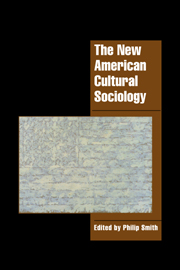Book contents
- Frontmatter
- Contents
- Notes on contributors
- Preface
- The new American cultural sociology: an introduction
- PART I Culture as text and code
- 1 Textuality and the postmodern turn in sociological theory
- 2 The computer as sacred and profane
- 3 AIDS and the discursive construction of homosexuality
- 4 Fundamentalism and liberalism in public religious discourse
- 5 Analytic and concrete forms of the autonomy of culture
- PART II The production and reception of culture
- PART III Culture in action
- Index
- Title in this Series
5 - Analytic and concrete forms of the autonomy of culture
Published online by Cambridge University Press: 18 January 2010
- Frontmatter
- Contents
- Notes on contributors
- Preface
- The new American cultural sociology: an introduction
- PART I Culture as text and code
- 1 Textuality and the postmodern turn in sociological theory
- 2 The computer as sacred and profane
- 3 AIDS and the discursive construction of homosexuality
- 4 Fundamentalism and liberalism in public religious discourse
- 5 Analytic and concrete forms of the autonomy of culture
- PART II The production and reception of culture
- PART III Culture in action
- Index
- Title in this Series
Summary
As the field of sociology renews its interest in culture, the role of cultural analysis in historical explanation has become a growing issue of contention. Traditionally, historical sociologists have fallen into two main theoretical camps when dealing with culture. Cultural reductionists have been instructed by Marx's famous utterance that “it is not the consciousness of men that determines their being, but, on the contrary, their social being that determines their consciousness” (in Tucker 1972, p. 4). Cultural determinists may have interpreted Weber's observation that “ideas have, like switchmen, determined the tracks along which action has been pushed by the dynamic of interest” (1958, p. 280) to mean that the ideal realm of social being is determinative in the last instance.
Recent progress in the fields of both cultural analysis and historical sociology has redefined the classic debate of material vs. ideal determination as an issue of cultural autonomy. Although this could be a positive theoretical step towards greater understanding of the role of culture in historical explanation, theoretical and methodological confusions about the autonomous nature of culture abound. In clearing the way for a historical sociology that incorporates cultural factors into explanation, many questions must be addressed. If autonomy is an attribute of structures, how is culture structural? Because culture has to do with subjective meaning, how can we recognize historical structures of culture? What is the relationship of material and ideational structures to each other and to the historical events in which they are situated?
Beginning with the most fundamental point, I define autonomy strictly in terms of independence. The theoretical question then seems clear enough: is culture independent? Now comes the murky element: independent of what?
- Type
- Chapter
- Information
- The New American Cultural Sociology , pp. 73 - 88Publisher: Cambridge University PressPrint publication year: 1998
- 3
- Cited by

